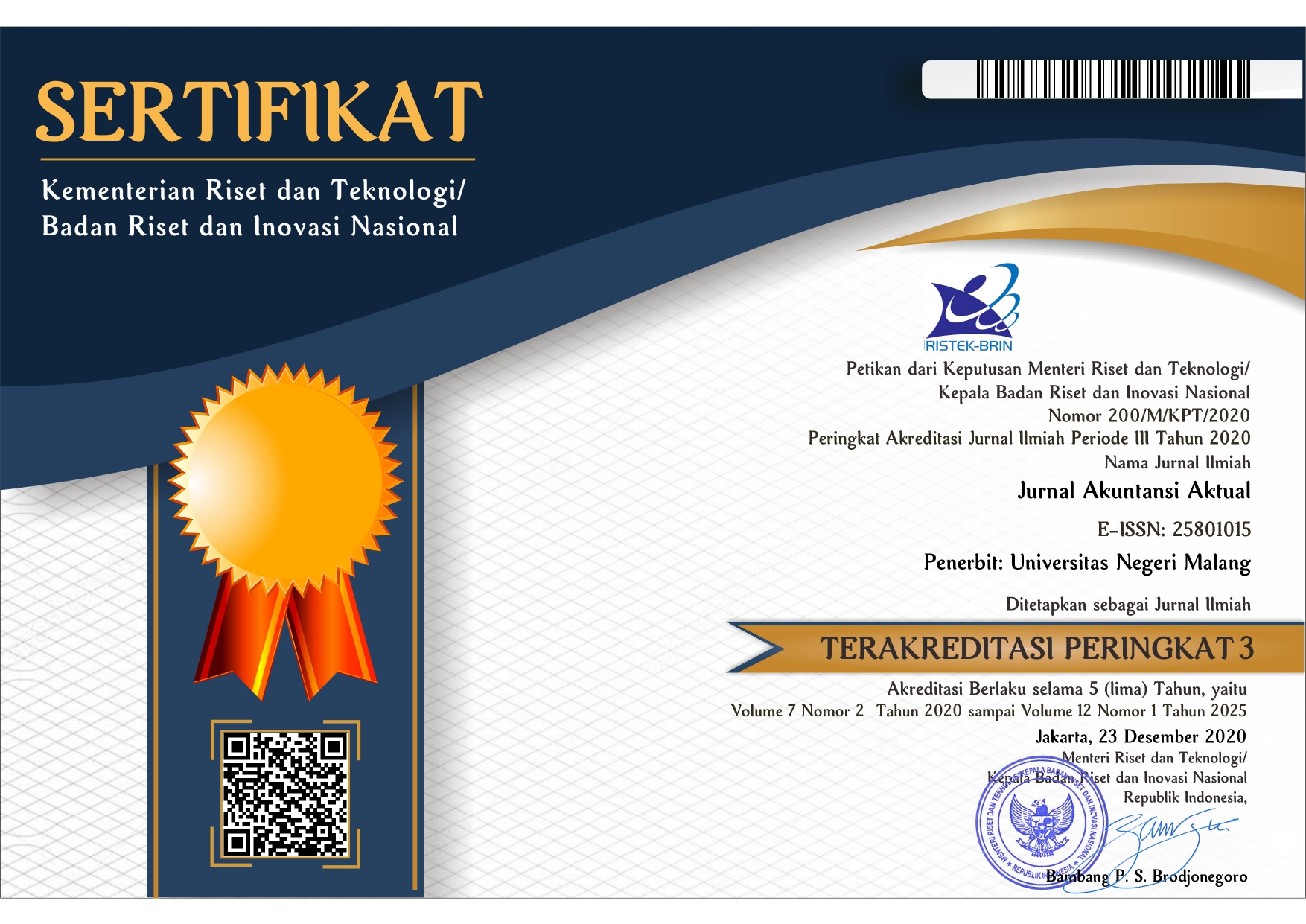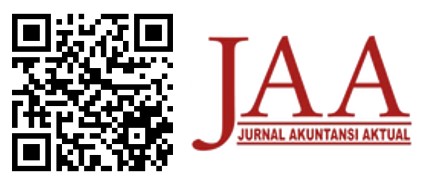Peran divisi internal control pada lembaga keuangan mikro syariah
Abstract
Keywords
Full Text:
PDFReferences
Adam, Okky Faisal, dan Suzan Leny. (2015). Pengaruh Pengendalian Internal terhadap Kecenderungan Kecurangan Akuntansi (Studi Kasus pada Baitul Mal Wa Tamwil Di Kota Salatiga). e-Proceeding of Management: 2(3), 3295-3302
Altamuro, J., & Beatty, A. (2010). How Does Internal Control Regulation Affect Financial Reporting. Journal of Accounting and Economics, 49(1–2), 58–74. https://doi.org/10.1016/j.jacceco.2009.07.002
Arifin, A., Purwanti, L., & Prihatiningtias, Y. W. (2018). Menyingkap Rahasia di Balik Runtuhnya Lembaga Keuangan Mikro ‘Bertopeng’ Syariah. Jurnal Manajemen Dan Kewirausahaan, 6(2), 136–155. https://doi.org/10.26905/jmdk.v6i2.2240
Creswell, J. W. (2016). Qualitative Inquiry & Research Design: Choosing Among Five Approaches (2nd ed.). California: Sage Publications, Inc.
Hajiha, Z., & Bazaz, M. S. (2015). Impact of Internal Control Material Weaknesses on Executive Compensation: Evidence from Iran. International Journal of Accounting, Auditing and Performance Evaluation, 12(1). https://doi.org/10.1504/ijaape.2016.073891
Hasmawati, Novrina, & Raharja. 2012. Pengaruh Ukuran Koperasi dan Jenis Koperasi Terhadap Kualitas Sistem Pengendalian Intern (Studi Kasus pada Koperasi di Semarang). Diponegoro Journal Of Accounting, 1 (2), 1-9
Hendro, Tri dan Cony Tjandra Raharja. 2014. Bank dan Institusi Keuangan Non Bank di Indonesia. Yogyakarta: UPP STIM YKPN
Hollander, J.A. (2004). The Social Contexts of Focus Groups. Journal of Contemporary Ethnography, 33 (5), 602-637.
Janwari, Yadi. (2015). Lembaga Keuangan Syaria. Bandung: Rosdakarya
Dashtbayaz, L. M., Salehi, M., & Safdel, T. (2019). The Effect of Internal Controls on Financial Reporting Quality in Iranian Family Firms. Journal of Family Business Management. https://doi.org/10.1108/JFBM-09-2018-0047
Moleong, L. J. (2017). Metodologi Penelitian Kualitatif. Bandung: Remaja Rosdakarya
Lubis, R. Hayati. (2015). Peranan Baitul Mal Wat Tamwil Terhadap Perekonomian Sumatera Utara. Al-Masharif: Jurnal Ilmu Ekonomi dan Keislaman, 3 (2), 114 – 129. https://doi.org/10.24952/masharif.v3i2.842
Masyithoh, N. D. (2017). Analisis Normatif Undang-Undang No. 1 Tahun 2013 Tentang Lembaga Keuangan Mikro (Lkm) atas Status Badan Hukum dan Pengawasan Baitul Maal Wat Tamwil (Bmt). Economica: Jurnal Ekonomi Islam, 5(2), 17. https://doi.org/10.21580/economica.2014.5.2.768
Mujiono, S. (2017). Eksistensi Lembaga Keuangan Mikro: Cikal Bakal Lahirnya BMT di Indonesia. Al Masraf: Jurnal Lembaga Keuangan dan Perbankan, 2(2), 207-215
Nawawi, A., & Salin, A. S. A. P. (2018). Internal Control and Employees’ Occupational Fraud on Expenditure Claims. Journal of Financial Crime, 25(3), 891–906. https://doi.org/10.1108/JFC-07-2017-0067
Oktafia, R. (2017). Percepatan Pertumbuhan Usaha Mikro, Kecil dan Menengah (UMKM) melalui Perkuatan Lembaga Keuangan Mikro Syariah (LKMS) di Jawa Timur. Jurnal Ekonomi Islam, 03(110), 85–92. https://doi.org/10.1007/s10750-010-0425-2
Parker, L. D. (2014). Qualitative Perspectives: Through a Methodological Lens. Qualitative Research in Accounting & Management, 11(1), 13-28.
Murwanti, Sri., & Sholahuddin, Muhammad. (2013). Peran Keuangan Lembaga Mikro Syariah untuk Usaha Mikro di Wonogiri. Proceeding Seminar Nasional Dan Call For Papers Sancall 2013 Surakarta, 23 Maret 2013, 300–309.
Rahim, S. A. A., Nawawi, A., & Salin, A. S. A. P. (2017). Internal Control Weaknesses in a Cooperative Body: Malaysian Experience. International Journal of Management Practice, 10(2), 131. https://doi.org/10.1504/ijmp.2017.083082
Shidarta, E. A., Astuti, Y. W., Kholilah., dan Putri, S. F. (2019). Praktik Murabahah pada Kanindo Syariah. El Dinar: Jurnal Keuangan dan Perbankan Syariah, 7(1), 16-31. https://doi.org/10.18860/ed.v7i1.6566
Sugiyono. (2016). Metode Penelitian Kuantitatif, Kualitatif, R & D. Bandung: IKAPI
Wulandari, P., & Kassim, S. (2016). Issues and Challenges in Financing The Poor: Case of Baitul Maal Wa Tamwil in Indonesia. International Journal of Bank Marketing, 34(2), 216-234. https://doi.org/10.1108/IJBM-01-2015-0007
Yusuf, S. D. 2014. Peran Strategis Baitul Maal Wa-Tamwil (BMT) Dalam Peningkatan Ekonomi Rakyat. Al-Mizan, 10(1), 69-80
Zelmiyanti, R., & Anita, L. (2015). Budaya Organisasi terhadap Pencegahan Fraud. Jurnal Akuntansi Keuangan dan Bisnis, 8 (10), 67–76
Zubair, M. K. (2016). Analisis Faktor-Faktor Sustainabilitas Lembaga Keuangan Mikro Syariah. IQTISHADIA Jurnal Kajian Ekonomi Dan Bisnis Islam, 9(2), 201. https://doi.org/10.21043/iqtishadia.v9i2.1728
DOI: http://dx.doi.org/10.17977/um004v7i22020p155
Refbacks
- There are currently no refbacks.

This work is licensed under a Creative Commons Attribution-ShareAlike 4.0 International License.
Jurnal Akuntansi Aktual is indexed by:













 orcid.org/0000-0003-1828-9642
orcid.org/0000-0003-1828-9642



